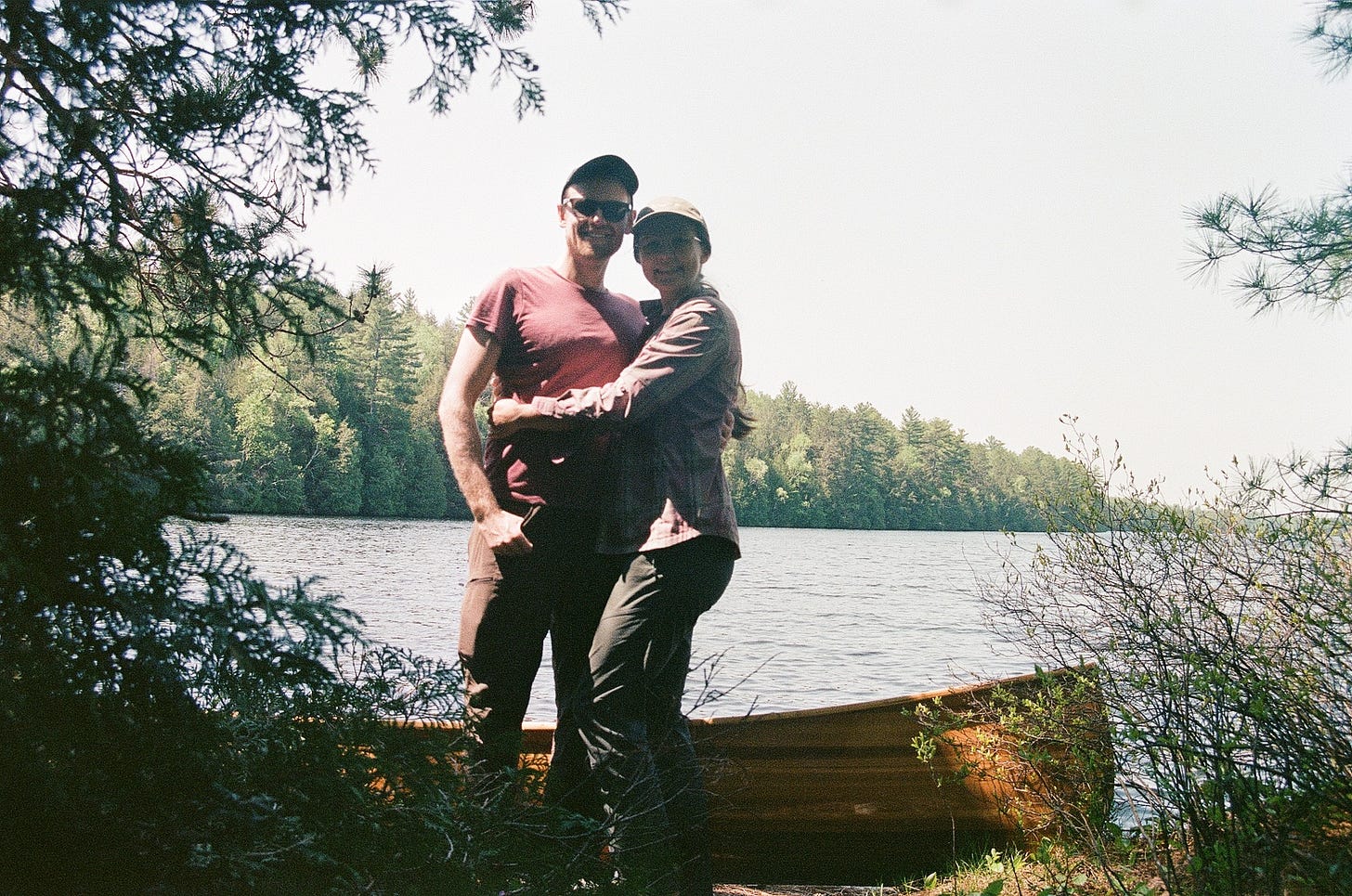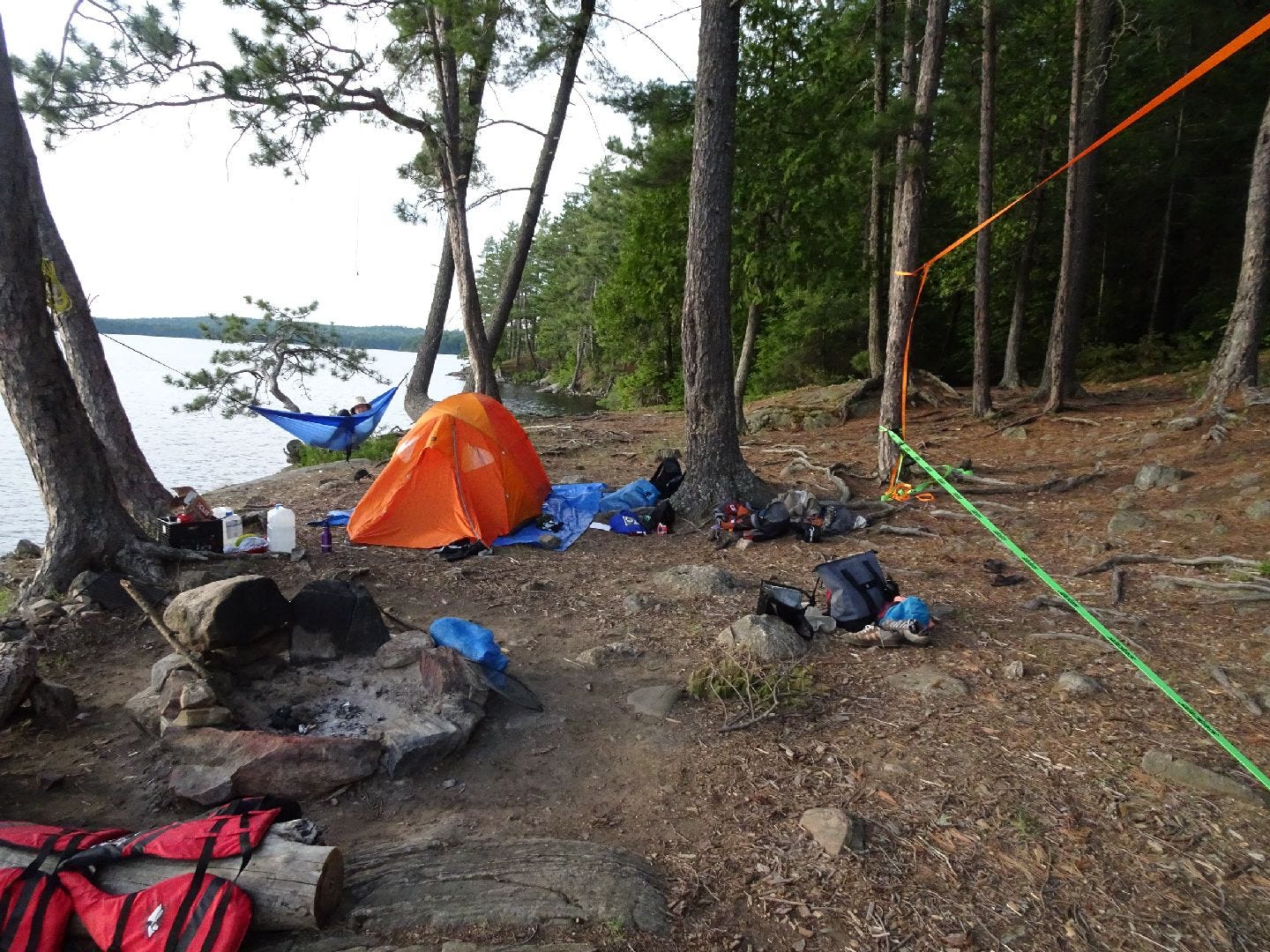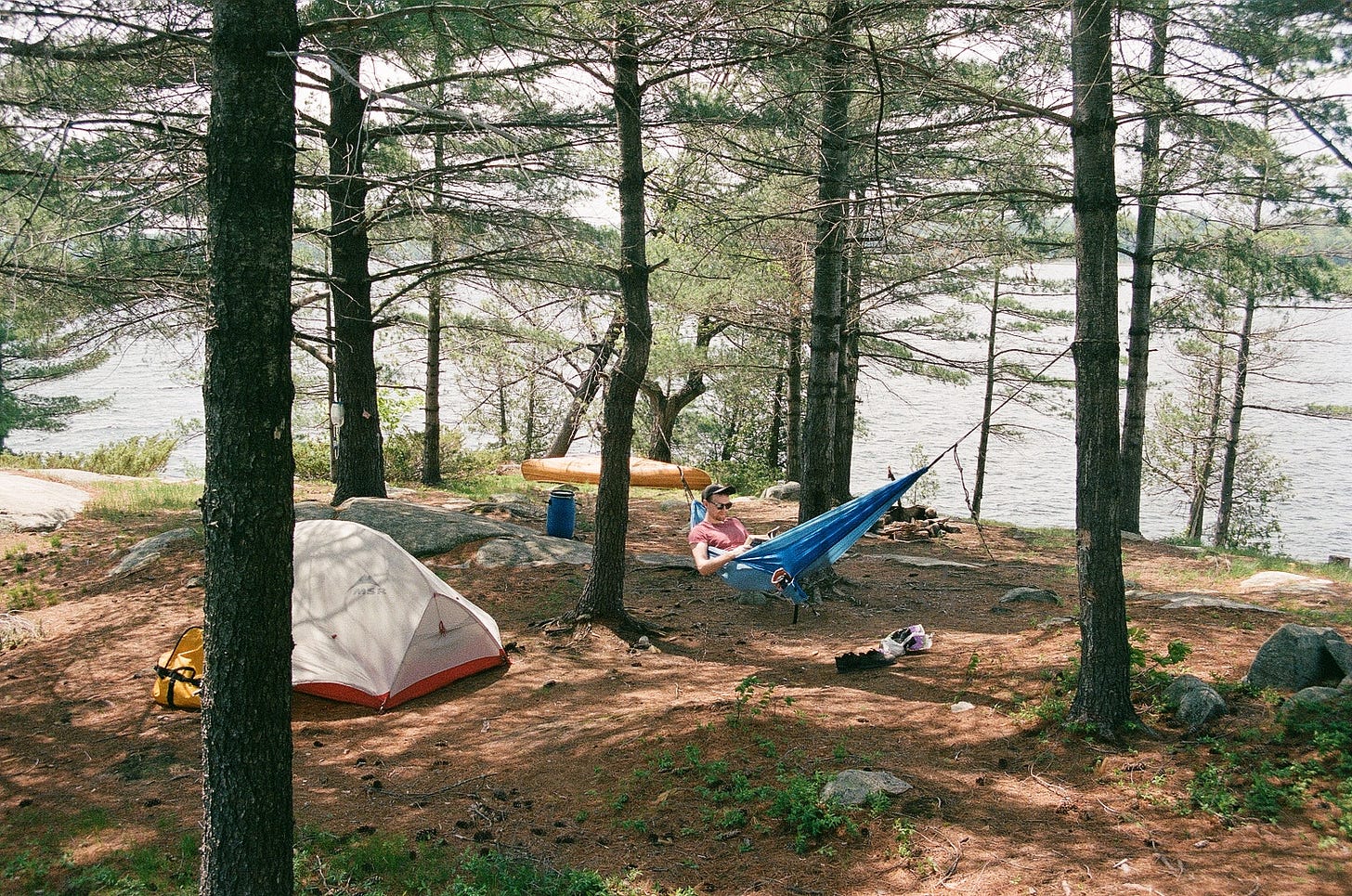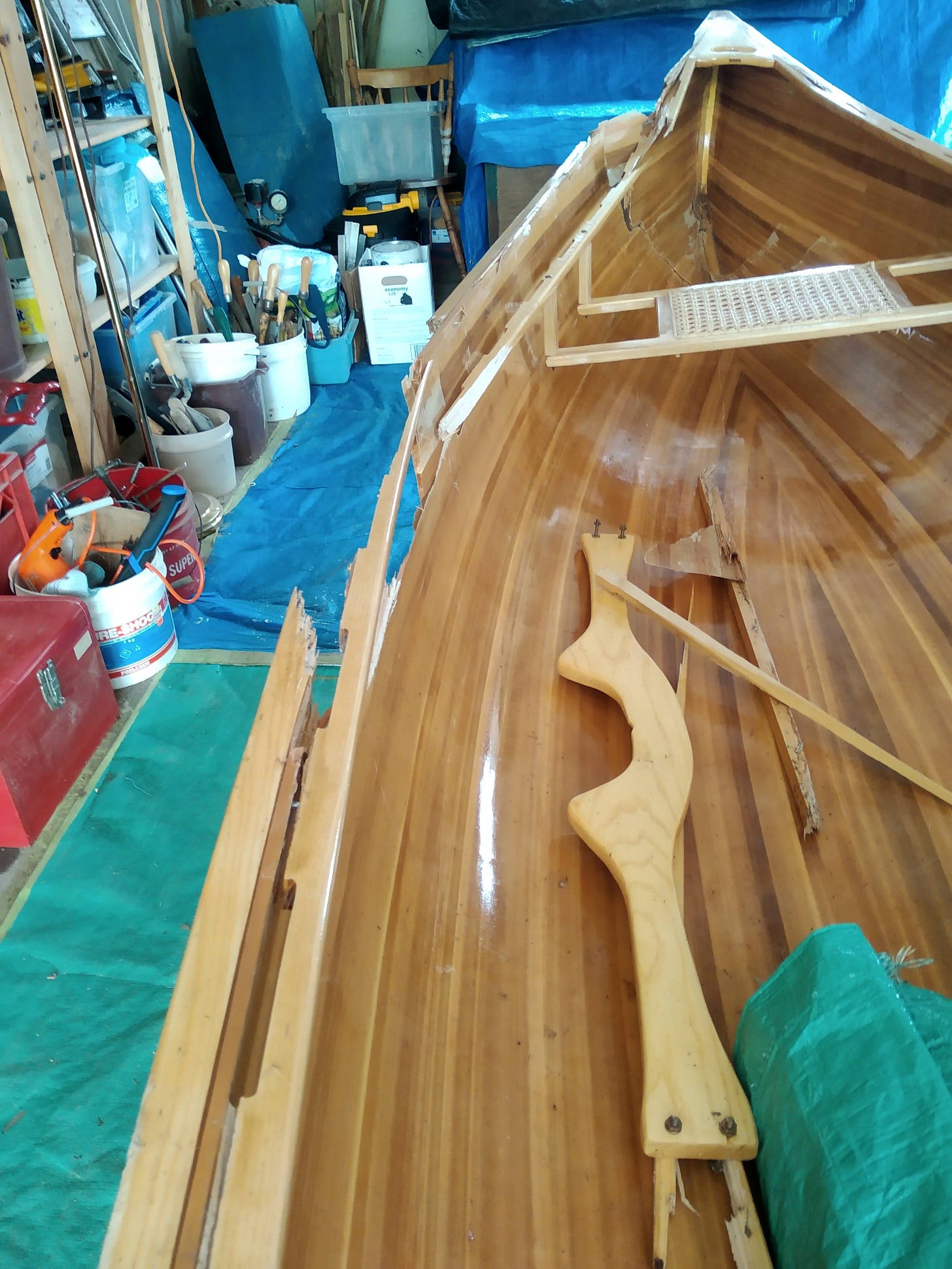If you can watch the canoe you gave your life to, broken
Lessons from Rudyard Kipling's "If—", the story of Eila and Steve's canoe (part 2)
Growing up, my family used to read poetry to each other around the dinner table. We would pass around a tattered copy of “A Child’s Anthology of Poetry”, and take our turns voicing the at-times dramatic or whimsical, rhythmic or free-flowing poems contained within its pages.
Many of the lessons from those poems have travelled with me throughout my youth and into my adulthood. They range from appreciation of nature (Trees, by Joyce Kilmer), to revelling in the absurd (Jabberwocky, by Lewis Carrol), to recognizing the power of our choices (The Road Not Taken, by Robert Frost).
One of our family favourites was If—, by Rudyard Kipling. In fact, my grandfather owned a brass plaque with the poem inscribed upon it. The plaque had been passed down to my father, and it mysteriously was hung on the door of the playhouse in our backyard. I don’t know how many times we read that poem around the dinner table, or how many times I traced the letters of that plaque on those endless summer days in the dry Calgary heat, but it was always there - a part of the tapestry of my childhood.
The poem speaks of winning and losing, confidence and humility, and maintaining equanimity in the face of all that life can throw at you.
If you can dream—and not make dreams your master;
If you can think—and not make thoughts your aim;
If you can meet with Triumph and Disaster
And treat those two imposters just the same;
If you can bear to hear the truth you’ve spoken
Twisted by knaves to make a trap for fools,
Or watch the things you gave your life to, broken,
And stoop and build ’em up with worn-out tools:
As a child, how could I have known that one day these lines would serve as both consolation and inspiration in the face of my own encounters with adversity?
Honks, tweets, and squabbles (Triumph)
This story picks up four months after the letter I wrote in part 1 of me and Steve’s canoe saga.
The wild geese had returned honking to Ottawa, and as their goslings hatched and waddled along the river banks, so too hatched the plans for our first camping trip of the season with our shiny new canoe. We would go to Big Gull Lake in North Frontenac for the May long weekend of 2022.
On the Friday night before the weekend we packed up our gear, strapped the canoe to the roof of the Matrix, and set out for our adventure. The days were getting longer, but by the time we arrived at the lake, the sun was low on the horizon. We paddled quickly across the lake to campsite number 3, a nice spot on a rocky island, and set up our tent in the dusk of early evening.
The next day dawned windy, and we decided to take it easy for the day. We would paddle out for a lunch somewhere on the lake, then come back and relax at our campsite.
We set out, and spent the morning in the canoe leisurely paddling with a tail wind. There were wetlands on one side of the big island, where we admired the hundreds of jewel-toned dragonflies flitting above the reeds. Then we backtracked and circumnavigated the island where the waters were deeper and free flowing.
The conversation alternated between little tweets as we congratulated ourselves on the canoe we had built, and little squabbles as we tried to decide on a name fitting of her beauty.
As I wrote in the letter, we were still undecided on the name of our canoe. Wild Goose Chaser was my personal favourite, but I had to admit it was a bit of a mouthful. Steve wanted something more noble, yet not too corny, and by the time we got to the narrow channel where we would eat our lunch, we still hadn’t come up with anything that was hitting the right notes.
As we were eating lunch, I couldn’t help but feel a sense of foreboding due to the strength of the wind that day. We would be paddling back into a headwind, so we ate quickly and did not waste any time in getting back to our campsite. Looking back, it’s a good thing we didn’t linger.
Ship-shape and shook-up (Disaster)
Something that Steve and I pride ourselves on is maintaining a tidy campsite. This did not come to us naturally. Here’s a photo from the first camping trip we ever took together, back in 2016. It’s a real mess, with random piles of gear and bags and bottles and clothing strewn all over the ground.
Refining our campsite organization started during our trip down Spanish River in 2020. We had to set-up camp each night and break camp each morning. This started out quite slow and awkward, but over the course of that trip, we established and perfected this routine. By the time we were camping on Big Gull Lake in 2022, it was second nature to keep all our gear in a single bag, our food in the barrel, and our life jackets and paddles under the canoe.
When we got back to the campsite after lunch, everything was ship-shape and we did not have much to do outside of relax and read our books in the hammock. From the island’s vantage point, looking into the wind across the lake, we could keep an eye on the weather and retreat into the tent should the forecasted thunderstorms materialize.
After maybe half an hour of reading, we realized that the previously far-off dark clouds had morphed into a massive storm front that was rapidly approaching. It looked like a literal wall - we could see where the water on the lake was getting thrown up as the black turbulence charged towards us.
It was a good thing our gear was already mostly put away: we had three minutes to prepare. Steve took down the hammock, and zipped our books up in the big yellow bag. As an afterthought, I took out an extra tarp and tied it between two trees over the tent and pinned the corner down into the ground as a windbreak in front of the tent. “Should we tie down the canoe?” Steve asked. There was no time - the storm was upon us.
Everything was silent. Everything was NOISE. The wind filled our ears our eyes our lungs our minds. The tarp pushed flat to the ground, pinning me underneath it as I struggled to get into the tent. The tent flapped and shrieked and its metal poles bent under the force of the wind and the tarp. Then in a flash - Steve was gone! He ran out into the winds; into the noise; into the terrible awesome magnificent horrific storm.
RIIIIIIIP! The tarp gave way, leaving behind the pin in the ground with a grommet and some strands of fabric looped around it’s hook. “STEVE!” I screamed his name, over and over, unable to fathom what had possessed him to run out, and terrified to leave the admittedly paltry shelter of the tent fly. Then he was back, and clutching and dragging behind him our beautiful, shiny, and now utterly cracked and fractured canoe.
“The winds took her like a feather - it flew down the island and smashed apart on some trees and rocks” he panted to me as an explanation as we cowered and clung to the canoe and each other for dear life.
“I’m scared”, I whimpered to Steve. We had no choice but to wait it out. There could be no rescue until the storm had passed.
The aftermath
Eventually the storm did pass. The winds let up, leaving behind only a gentle spattering of rain in it’s wake. We emerged from our now misshapen tent to a new world. The aspect of the land had been fundamentally altered, with giant swaths of trees down both on our island and on the shores of the mainland.
We wandered our campsite in a daze, eventually tracking down our life jackets and the tarp which had gotten stuck in a tree.
The canoe was broken. The canoe we had poured our lives into, our greatest triumph, every inch of it lovingly sawed and sanded and polished with our own two sets of hands, was broken and not gonna float. And we were stuck on an island with no means of getting off.
Luckily, maybe an hour after the storm was gone, we heard the putt-putt of a motorboat coming towards us from one of the cottages up the lake. A local had seen us camping and came out to check on us. “Need any help?” he inquired. We took him up on the offer and hitched a ride back to the boat launch, the canoe perched precariously across the back of his boat.
Once back on the mainland, we did not waste any time. We threw the canoe up on the roof of the car, and tied it down as best we could, given the bow was three quarters of the way to being completely ripped off. Then we drove. We drove past locals on ATVs with chainsaws strapped to their backs. We drove past countless fallen tree trunks that had been sawed and cleared from the roads by the locals. We drove past a house with the roof ripped clean off.
And as we drove, we tried to digest what had happened to the land, to the canoe, and to our psyches.
It was on this drive that the poem If— came once again to my mind, dredged up from those distant childhood days of wondering how I might react in a circumstance as grandiose as those portrayed in its lines.
If you can meet with Triumph and Disaster
And treat those two imposters just the same;
I pulled up the poem on my phone and read it aloud to Steve as we made our way along the windblasted roads.
Or watch the things you gave your life to, broken,
And stoop and build ’em up with worn-out tools:
Like a phoenix, a new dream was rising from the sawdust of our wrecked canoe. We would stoop and build her up with worn out tools. And her name? She was Triumph and Disaster.








Fantastic